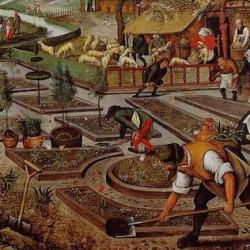Luigino Bruni (The Wound and the Blessing) argues that “society without markets and contracts cannot be civil.” Without markets “it is not mutual love that usually takes their place; the void left without contracts is frequently filled by power relationships in which the strongest exploit the weakest.” He admits that there are strong and weak in the market too, but suggests that there they “can usually be recognized and the asymmetry in these relationships can perhaps be overcome” (xxii).
Yet, modern economic theory, and the market that has been constructed in accord with theory, inhibits the kinds of interpersonal relationships that make for deep fulfillment and genuine happiness. Taking his cue from the story of Jacob wrestling with the angel (Genesis 32) he suggests that “Sooner or later every person has an experience that marks the coming to full maturity: we understand in the depths of body and soul that to experience the blessing which is bound up in a relationship with another, we must accept its wound as well” (xx).
That’s precisely the kind of wounding relationship the market prevents: “Economic science in late modernity, with its promise of life together without sacrifice, represents a great escape from the contagion of a personal relationship with the other. . . . Behind it there is a great illusion that the market, or a bureaucratic and hierarchical enterprise, could offer a painless and peaceful society, mediating encounters with others with whom we interact harmlessly, without contention or wound.” I might be wounded by an encounter at a retail store, but only if things go wrong; the setup is designed to facilitate impersonal, harm-less exchanges (xxi). And this becomes especially acute in “postmodern markets,” where we don’t even have to be in the same hemisphere as the sales clerk who fills our order (xxi).
If the market were confined to one sector of our social life, this might be tolerable. Certainly the impersonalism of the market’s mediation has its advantages and efficiencies. But as Bruni points out, the market doesn’t stay put: It has become “the principal means of organizing community life” permeating “the whole of civil society from health care to schools, from child care to elder care” (18). Given the permeation of frictionless encounters, Bruni doesn’t think it’s any wonder that we are both insanely wealthy and unhappy. There is a “tipping point” when the market begins to produce loneliness and dissolve the bonds of identity we have with others (xxiii). Bruni thinks we are at or past that tipping point.














